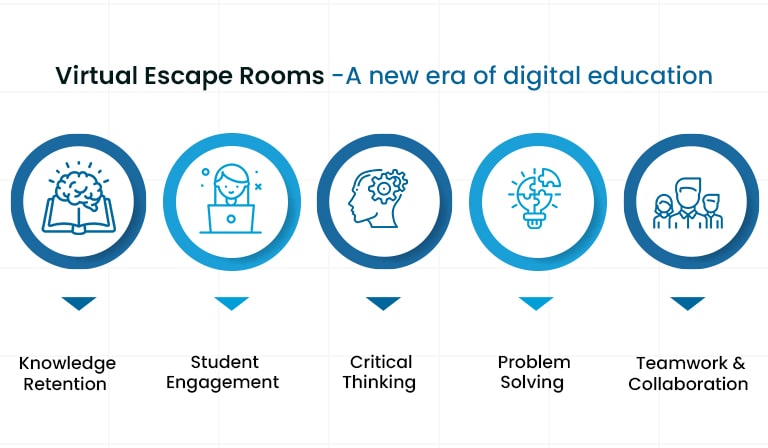Escaping to Excellence: Virtual Escape Rooms for Enhanced Learning
In recent years, virtual escape rooms have soared in popularity, drawing people deeper into the virtual realm. These games lock players inside a digital chamber, challenging them to crack puzzles and conquer obstacles, all within a time limit. Beyond the thrill of the experience, online escape rooms offer substantial advantages. They not only hone critical thinking and problem-solving skills but also nurture teamwork and coordination among participants.
Critical thinking and problem-solving rank as indispensable life skills, relevant in everything from everyday tasks to intricate professional decision-making. Critical thinking means dissecting information, challenging assumptions, and evaluating evidence to draw a reasoned conclusion. Problem-solving skills, on the other hand, involve spotting, dissecting, and resolving issues. Engaging in virtual escape rooms provides a playful yet effective way to cultivate and refine these vital skills.
Transforming Education with Virtual Escape Rooms

Virtual escape rooms can be a fun and engaging way to incorporate active learning and problem-solving into the teaching process, providing an immersive experience that can enhance student engagement and knowledge retention.
One way to use virtual escape rooms in teaching is to introduce new course material. Educators can design online escape rooms that incorporate key concepts and themes from their courses, transforming them into puzzles and challenges. This approach can help students become more invested in their learning and motivated to explore the course material.
Another way to use virtual escape rooms is to reinforce learning. Incorporating review questions and quizzes in the form of puzzles or challenges can help students retain information and solidify their understanding of the course material. This approach can be especially effective for students who struggle with traditional forms of learning and assessment.
Virtual escape rooms serve as a valuable tool for fostering teamwork and enhancing collaboration skills among students. Through collaborative efforts to unravel puzzles and decipher the intricacies of online escape rooms, students acquire the aptitude for effective communication, the ability to share ideas, and the reliance on each other’s individual strengths. This methodology proves particularly advantageous for facilitating social interaction and fostering community within digital learning environments.
Furthermore, virtual escape rooms offer an innovative means of assessment. By presenting course content in an engaging and interactive format, educators can evaluate students’ comprehension of key concepts in a more profound manner. This approach enables educators to gain valuable insights into student performance, subsequently allowing for the adjustment of teaching methodologies.
Integrating Virtual Escape Rooms with the Interactive Möbius Platform
Möbius, a digital learning platform by DigitalEd India, is designed for crafting innovative blended learning environments, offering opportunities for skill development and personalized learning. The integration of virtual escape rooms into Möbius elevates learner engagement, fosters immersion, and subsequently optimizes overall learning outcomes.
Advantages of utilizing virtual escape rooms with Möbius:
- Enhance critical thinking and problem-solving: These rooms present intricate puzzles that demand critical thinking, logic, and problem-solving skills. Solving these challenges fosters innovative problem-solving approaches, leading to improved academic performance.
- Foster teamwork and collaboration: Virtual escape rooms are inherently group activities, fostering teamwork and collaboration. Students learn effective communication, idea-sharing, and reliance on each other’s strengths while working together to conquer challenges.
- Elevate engagement and motivation: These rooms provide an immersive, enjoyable avenue for students to engage with course material. Integrating academic concepts into puzzles ignites motivation and deepens students’ investment in their learning.
- Support language learning: Online escape rooms can integrate vocabulary and grammar exercises, aiding language learning. Students engage with language in an interactive, enjoyable manner, bolstering language proficiency and boosting confidence in its use.
- Cultivate digital literacy: Virtual escape rooms, in particular, hone digital literacy by teaching skills like navigating digital interfaces, troubleshooting technical issues, and collaborating remotely.
Guidelines for Crafting Effective Virtual Escape Rooms in eLearning:
- Define Clear Learning Objectives: Begin by articulating specific STEM concepts to reinforce or introduce, alongside the skills to develop. Well-defined learning objectives steer puzzle creation toward relevance and efficacy.
- Foster Engagement: Vital to an online escape room’s success is its ability to captivate students. Employ a diverse range of puzzles – logic, coding, mathematics – for a dynamic experience. Enhance immersion with multimedia elements like videos, animations, and sound effects.
- Encourage Feedback: Creating a positive learning environment involves embracing feedback. Instructors who demonstrate receptivity to student input foster trust and collaboration. Such an environment nurtures support and better student outcomes.
- Balance Difficulty Level: A quality online escape room should challenge without causing frustration or waning interest. Maintain a balance between puzzles of varying difficulty. Consider offering subtle hints or clues to aid struggling students, avoiding overly simplistic solutions.
- Promote Teamwork: Harness virtual escape rooms as a catalyst for teamwork and collaboration. Include puzzles and challenges necessitating effective communication and cooperation among students. This fosters engagement and cultivates crucial teamwork skills and peer-to-peer learning.
In conclusion, virtual escape rooms present an engaging avenue for students to explore STEM subjects, fostering essential attributes such as critical thinking, teamwork, and creativity. These versatile educational tools empower educators to reinforce concepts, introduce new concepts, and assess student progress effectively. Given their adaptability and ease of creation, virtual escape rooms stand poised to play a pivotal role in the evolving landscape of online education, offering educators an invaluable means of captivating and inspiring their students.
Want to experience a virtual escape room by Möbius?
Here is a sample for Graduate students: https://digitaled.mobius.cloud/7
Book a personalized demo to explore deeper.
Author
Deepali Singh